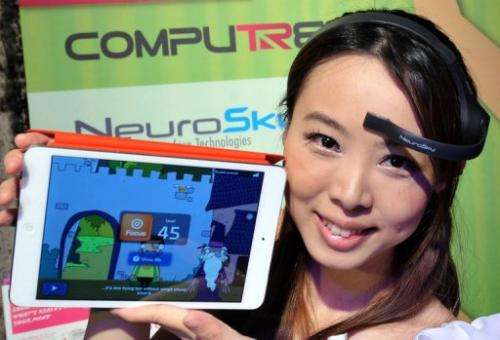A promoter wears a NeuroSky brainwave starter kit called "MindWave Mobile" during a pre-show press conference for 2013 Computex Taipei show on May 28, 2013. Computex is Asia's biggest annual IT trade fair, which opens on June 4. AFP PHOTO / Mandy CHENG
Finger fatigue after hours of video gaming may become a thing of the past, as firms unveil headsets that measures users' brainwaves and allow them to interact with apps installed in computers.
The new technology is part of a wider exhibition of wearable computing, the next great frontier in consumer electronics, on display at Taipei's Computex trade fair.
At the show on Wednesday US chip company NeuroSky promoted its new product MindWave Mobile—a brain-computer interface which allows headset-wearing users to interact with apps in computers and other devices without lifting a finger.
Wearing a MindWave headset, a member of staff demonstrated how to pilot a toy helicopter using just his thoughts.
Chips inside the headset measure brainwave signals and transfer data via Bluetooth to wirelessly communicate with users' computers or mobile devices, explained Giant Lin, a representative of NeuroSky's Taiwan branch.
"It's amazing. It can detect what you think. Maybe you can use your mindwaves to control a car. That's technology," said Alpha Alexander Atega, a visitor at the fair, after trying a headset.
The Silicon Valley-based company has been targeting its technology at brain training games and educational apps.
Mindwave technology has already been taken up by several schools in Malaysia and Singapore, said Lin, in programmes designed to help students improve their concentration.
"We believe that such technologies have huge potential as lots of families, especially in Chinese communities, pay heed to education," he said.
The firm is now looking for new partners to develop other applications which could use the chips, said Lin.
More than 1,700 exhibitors are displaying their latest products at 5,000 booths in Computex Taipei, drawing an estimated 130,000 visitors, including 36,000 visitors from abroad, the organisers said.
© 2013 AFP























